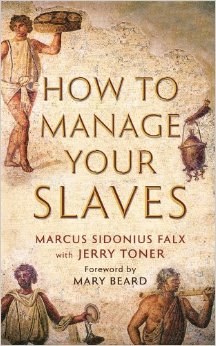What is the difference between a slave and a free man? A slave has a master. That master, a cruel and ruthless villain, is telling the slave what to do and punishing him at will. However, at the same time, the master guarantees food and a roof over the slave’s head. A slave understands this exchange of freedom for food as a fair trade, while a free man values freedom more. That’s the difference. That’s how it was in the Roman empire centuries ago. But isn’t that how it is now too? Aren’t we ancient slaves in our offices and in front of our monitors?
This post is partially provoked by a recently published semi-historical book How to Manage Your Slaves by Jerry Toner. However, there’s more. The entire eXtremely Distributed Software Development (XDSD) methodology is based on a primary fundamental principle that states, “Everyone gets paid for verified deliverables.” They’re not paid for their time per hour, per week, or per month, but rather for verified deliverables. What is the difference and what does all this have to do with slavery? Let’s see.
My point here is that any payment schedule based on time instead of results is turning us into slaves.
Here is an example. Say I’m a software developer and I need some money to pay my bills, buy a car, rent a house, and enjoy my life. I have some skills for that. I can write Java software. I find a company that needs my skills. It hires me, and we sign a contract. The contract says I have to be in the office from 9 until 5 and I have to do what my boss tells me to do. In exchange, I will get paychecks every few weeks, which will cover my expenses.
Doesn’t it look similar to what I just said above about ancient slaves? The master (a.k.a. CEO) tells me what to do and punishes me at will; in exchange, he gives me food and safety.
The problem here is not about punishment. This model of work makes me think like a slave. I think this is a fair exchange—I give away my freedom (my time), and I get back food and safety. I’m a slave not because the master is punishing me and I’m sitting all day long in fetters. Absolutely not. A slave is not the one who was captured and imprisoned. A slave is one who thinks slavery is a fair way of management.
Letting someone tell me what to do with my time in order to get food in return is exactly what slavery is about.
What is freedom, then? How should a free man make money?
A free man sells the results of his work. A free man cleans someone’s house and bills him when the work is done. A free man drives passengers from the airport to their home and bills them when they get there. A free man creates a software module and bills the client when it’s ready. A free man translates a document and bills per page. A free man cooks a cake and bills for it.
A free man sells results, not time.
Also, a free man takes care of the food and security on his or her own.
Is it more risky? Yes. Is it more stressful? Yes. But that’s what freedom is about.
This is my favorite quote from the book: “a good slave is loyal, hard-working and vigilant.”
Think about it.

